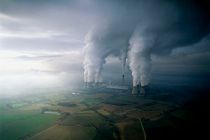CO2 emissions set for record levels in 2010
Global emissions of carbon dioxide are on course to hit record levels in 2010, a report by the Global Carbon Project (GCP) indicated on Monday. An expected rise in emissions of around three per cent is expected, led largely by India and China.

Global emissions of carbon dioxide are on course to hit record levels in 2010, a report by the Global Carbon Project (GCP) indicated on Monday. An expected rise in emissions of around three per cent is expected, led largely by India and China.
"The real surprise was that we were expecting a bigger dip due to the financial crisis in terms of fossil fuel emissions," said Pep Canadell, Executive Director of the GCP and a coauthor of the study, on the telephone to Reuters.
The GCP report also states that emissions from deforestation have declined and are now around 10 per cent of greenhouse emissions. However, rising levels of carbon dioxide emissions from burning fossil fuels like coal are contributing to climate change. Canadell indicated the rise would see levels of emissions return to the growth rates observed through 2000 to 2008.
"The implication of this kind of growth rate is that you're quickly moving into well beyond the two degrees Celsius warming target,' said Canadell. "Emerging economies are taking a bigger share of the global production of wealth and they do it with more carbon-intense energy systems."
Fuelling the growth rate is demand for goods from Brazil, India and China, which is simultaneously driving up demand for oil, coal and gas from the three countries.
In contrast to the emerging economies, overall emissions from developing nations fell in 2009. UK emissions fell 8.6 per cent whilst emissions from the United States and Japan fell 6.9 per cent and 11.8 per cent respectively. In contrast China, the world's top polluter, saw emissions rise by 8 per cent and India by 6.2 per cent.
The report also shows concentration of carbon dioxide in the air continues to rise to about 387 parts per million (ppm) in comparison to 280 ppm two hundred years ago, at the start of the industrial revolution. The world has increased in temperature by 0.7 degrees Celsius over the last century, a century which has seen higher sea levels and severe droughts disrupting food supplies.
The research, led by a consortium of international research bodies including the University of Exeter and the University of East Anglia, comes a week before the 16th Conference of Parties (COP16) in Cancun, running from 29 November-10 December, and stresses the need for nations to take action to curb greenhouse gas emissions.
However, the task in Cancun can be put into perspective when it is considered that though emissions fell in 2009, the overall amount of global carbon emissions was still the second highest in history, after 2008. By the end of 2010 it is expected to reach record levels. The massive economic growth in India and China could prove a stumbling block in the drive to seal legally binding emissions targets in Cancun and could hinder progression toward low carbon renewable energy.
Developing nations may argue that developed countries have the infrastructure and money to switch to these technologies and that without substantial aid emissions in developed countries will continue to fall as those in the developing world rise.
The GCP was set up in 2001 to track CO2 emissions and research Earth's carbon cycle. Their report is available in the latest issue of Nature Geoscience and some delegates at COP16 may cite their report as a call to action on climate change. Author: Leroy Robinson| Climate Action Image: thewritingzone| Flickr






